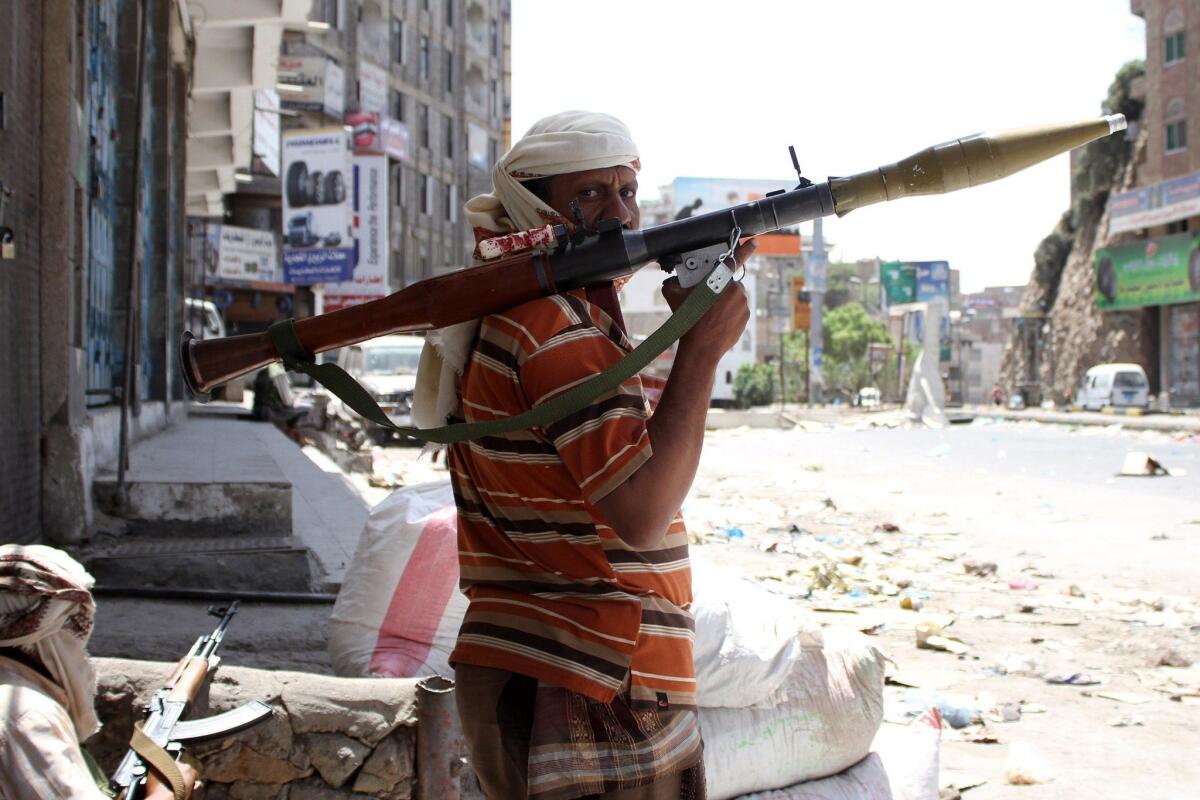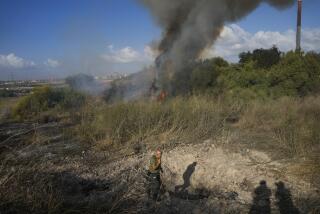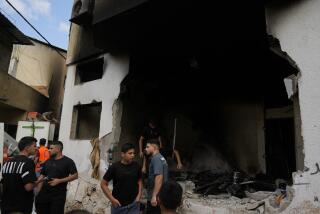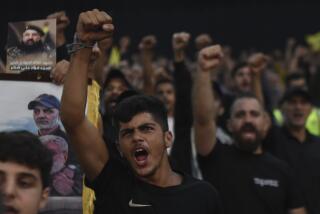Al Qaeda seizes Yemen airport, military base; U.N. envoy resigns

Al Qaeda’s branch in Yemen, capitalizing on the chaos gripping the country, was reported to have taken control of an airport, oil terminal and other facilities near a key southern city on Thursday.
That news came as the United Nations’ special envoy to Yemen resigned under pressure, after four years of diplomacy failed to avert a war that has killed hundreds and caused an escalating humanitarian crisis in the Arab world’s poorest nation.
Al Qaeda in the Arabian Peninsula, regarded by many as the most lethal branch of the organization, claimed control of the Riyan airport and a nearby military base outside the city of Mukalla, the Associated Press reported. The militants also seized an Arabian Sea port housing the oil terminal.
The Al Qaeda branch overran much of Mukalla this month, looting the local branch of the central bank and freeing hundreds of comrades from prison, including a senior leader of the group.
Yemeni security officials in the capital, Sana, speaking on condition of anonymity because they were not authorized to brief the press, said the leaders of the brigade in charge of protecting the area fled.
Mukalla is the capital of Yemen’s largest province, Hadramawt, where Al Qaeda has long maintained a presence despite U.S. drone strikes and Yemeni counter-terrorism operations.
“They are consolidating their hold of the city and will paralyze the whole coast of Hadramawt,” said Nasser Baqazouz, an activist in the city, who added that the troops guarding the airport put up little resistance.
The Al Qaeda gains came after an offensive by Houthi rebels, who seized the capital, ousted Yemeni President Abdu Rabu Mansour Hadi and now are attempting to consolidate their grip on the rest of the country.
Although they are staunch opponents of Al Qaeda, the Houthis are caught up in fierce clashes with supporters of Hadi.
Neighboring Saudi Arabia has organized a coalition of Arab states that are conducting airstrikes against the Shiite Muslim Houthis. But they haven’t been targeting areas with an Al Qaeda presence.
“The goals we have are clear, which are supporting President Mansour’s legitimacy, bringing stability back to Yemen and preventing Houthi militias from harming the region and harming Yemeni citizens,” Saudi Brig. Gen. Ahmed Asiri, a spokesman for the campaign, told reporters Thursday.
The country’s slide into civil war led to the departure of the U.N. envoy, Jamal Benomar, a Moroccan-born diplomat who previously served as a U.N. representative in Iraq and Afghanistan. He had lost the support of Saudi Arabia and its Persian Gulf allies.
A statement issued by the U.N. late Wednesday said Benomar had “expressed an interest in moving on to another assignment” and a successor would be named “in due course.”
“Until that time and beyond, the United Nations will continue to spare no efforts to relaunch the peace process in order to get the political transition back on track,” the statement said.
In 2011, Benomar brokered a transition plan backed by the gulf monarchies after an uprising forced Yemen’s longtime strongman, Ali Abdullah Saleh, to hand over power.
At the time, Yemen was viewed as a model for a peaceful transition after the upheavals of the “Arab Spring.” But the political process gradually unraveled.
Last year, the Houthi rebels swept down from their northern strongholds and took control of Sana. The gulf-backed Hadi took refuge in the southern commercial hub of Aden being driven into exile last month in the Saudi capital, Riyadh.
As the fighting has escalated, Benomar’s efforts to mediate an accord between the warring factions have come under criticism from the Sunni Arab gulf states, which see the Houthis as proxies for Shiite Muslim-led Iran. Leaders in Tehran deny arming the insurgents and have called for an end to the airstrikes in Yemen.
Ministers from the six-member Gulf Cooperation Council met with U.N. Secretary-General Ban Ki-moon in Kuwait in March and told him of their unhappiness with Benomar, the AP said, citing unidentified diplomats.
Both Hadi and the Houthis have also been irked by the envoy. But Hadi’s new vice president, Khaled Bahah, said the envoy was not to blame for the collapse of the peace process. “It was we the political parties who have really not helped Benomar,” he told reporters in Riyadh.
Bahah called on the Houthis and elements of Yemen’s armed forces still loyal to Saleh to end their offensive on Aden and return to U.N.-led talks.
“We consider Aden to be the key to peace, the key to the solution,” Bahah said. “We will not talk about any initiatives until we see the war machine has stopped in Yemen, and in Aden in particular.”
The U.N. Security Council this week imposed an arms embargo on the Houthis and blacklisted their leader, Abdel-Malek al-Houthi. Similar action was taken in November against Saleh, who has struck an alliance with the Houthis.
The latest U.N. resolution did not mention the Saudi-led airstrikes, which humanitarian organizations say have damaged schools, hospitals and other critical infrastructure along with military targets.
Multiple strikes on a dairy factory located near military bases on the outskirts of the Red Sea port of Hudaydah killed at least 31 civilians and injured 11 others March 31, the New York-based Human Rights Watch said in a statement Thursday.
The Saudi command says the coalition takes steps to avert civilian casualties, many of which they blame on the pro-Houthi forces.
Riad Yassin, the foreign minister in Hadi’s ousted government, publicly asserted that Houthi forces had shelled the factory, but provided no information to substantiate the claim, according to Human Rights Watch.
Special correspondent Amro Hassan in Berlin contributed to this report.
Twitter: @alexzavis
More to Read
Sign up for Essential California
The most important California stories and recommendations in your inbox every morning.
You may occasionally receive promotional content from the Los Angeles Times.











